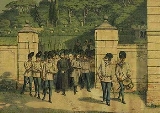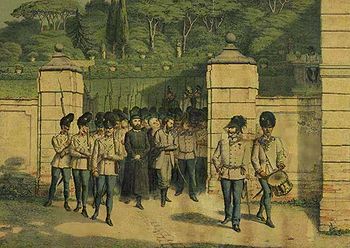
Ugo Bassi
Encyclopedia
Ugo Bassi was a Roman Catholic priest and Italian nationalist.
, Emilia-Romagna
, and received his early education at Bologna
.
An unhappy love affair induced him to become a novice in the Barnabite order when eighteen years old. He returned to Rome
, where he led a life of study and devotion, and entered into his ministry in 1833. It was as a preacher that he became famous, his sermons attracting large crowds owing to their eloquence and genuine enthusiasm. He lived chiefly in Bologna, but travelled all over Italy preaching and tending the poor. He was so poor himself that he often did not have food to eat.
At the outbreak of the revolutionary movements in 1848
, when Pope Pius IX
still appeared to be a Liberal
and an Italian nationalist. As a result, Father Bassi, filled with enthusiasm, joined General Durando
's papal force to protect the frontiers as an army chaplain. His eloquence drew fresh recruits to the ranks, and he exercised great influence over the soldiers and people. When the Supreme Pontiff renounced all connection with the nationalist movement, it was only Bassi who could restrain Bolognese Liberals in their indignation.
At Treviso
, where he had followed Guidotti's volunteers against the Austria
ns, he received three wounds, delighted to shed his blood for Italy (May 12, 1848). He was taken to Venice
, and on his recovery he marched unarmed at the head of the volunteers in the fight at Mestre
. After the Pope's flight from Rome and the proclamation of the Roman Republic, Bassi took part with Garibaldi
's forces against the French troops sent to re-establish the temporal power. He risked his life many times while tending the wounded under fire, and when Garibaldi was forced to retreat from Rome with his volunteers his chaplain followed him in his march to San Marino.
 When the legion broke up, Garibaldi escaped. But Father Bassi and a fellow-Garibaldian, Count Livraghi, after a long manhunt were captured near Comacchio
When the legion broke up, Garibaldi escaped. But Father Bassi and a fellow-Garibaldian, Count Livraghi, after a long manhunt were captured near Comacchio
. On being brought before the papal governor, Bassi said: "I am guilty of no crime save that of being an Italian like yourself. I have risked my life for Italy, and your duty is to do good to those who have suffered for her." The governor responded by handing the prisoners over to an Austrian officer. They were escorted to Bologna, convicted by a military tribunal
with having been caught bearing arms. Both men were executed by firing squad on 8 August 1849.
The execution of Father Bassi enraged Liberals all over Europe.
Biography
Bassi was born at CentoCento
Cento is a city and comune in the province of Ferrara, part of the region Emilia-Romagna . In Italian "cento" means 100.-History:The name Cento is a reference to the centuriation of the Po Valley...
, Emilia-Romagna
Emilia-Romagna
Emilia–Romagna is an administrative region of Northern Italy comprising the two historic regions of Emilia and Romagna. The capital is Bologna; it has an area of and about 4.4 million inhabitants....
, and received his early education at Bologna
University of Bologna
The Alma Mater Studiorum - University of Bologna is the oldest continually operating university in the world, the word 'universitas' being first used by this institution at its foundation. The true date of its founding is uncertain, but believed by most accounts to have been 1088...
.
An unhappy love affair induced him to become a novice in the Barnabite order when eighteen years old. He returned to Rome
Rome
Rome is the capital of Italy and the country's largest and most populated city and comune, with over 2.7 million residents in . The city is located in the central-western portion of the Italian Peninsula, on the Tiber River within the Lazio region of Italy.Rome's history spans two and a half...
, where he led a life of study and devotion, and entered into his ministry in 1833. It was as a preacher that he became famous, his sermons attracting large crowds owing to their eloquence and genuine enthusiasm. He lived chiefly in Bologna, but travelled all over Italy preaching and tending the poor. He was so poor himself that he often did not have food to eat.
At the outbreak of the revolutionary movements in 1848
Revolutions of 1848
The European Revolutions of 1848, known in some countries as the Spring of Nations, Springtime of the Peoples or the Year of Revolution, were a series of political upheavals throughout Europe in 1848. It was the first Europe-wide collapse of traditional authority, but within a year reactionary...
, when Pope Pius IX
Pope Pius IX
Blessed Pope Pius IX , born Giovanni Maria Mastai-Ferretti, was the longest-reigning elected Pope in the history of the Catholic Church, serving from 16 June 1846 until his death, a period of nearly 32 years. During his pontificate, he convened the First Vatican Council in 1869, which decreed papal...
still appeared to be a Liberal
Classical liberalism
Classical liberalism is the philosophy committed to the ideal of limited government, constitutionalism, rule of law, due process, and liberty of individuals including freedom of religion, speech, press, assembly, and free markets....
and an Italian nationalist. As a result, Father Bassi, filled with enthusiasm, joined General Durando
Giacomo Durando
Giacomo Durando was an Italian general and statesman. His brother Giovanni was also a general of the Risorgimento and a senator.-Biography:Durando was born at Mondovì, in Piedmont...
's papal force to protect the frontiers as an army chaplain. His eloquence drew fresh recruits to the ranks, and he exercised great influence over the soldiers and people. When the Supreme Pontiff renounced all connection with the nationalist movement, it was only Bassi who could restrain Bolognese Liberals in their indignation.
At Treviso
Treviso
Treviso is a city and comune in Veneto, northern Italy. It is the capital of the province of Treviso and the municipality has 82,854 inhabitants : some 3,000 live within the Venetian walls or in the historical and monumental center, some 80,000 live in the urban center proper, while the city...
, where he had followed Guidotti's volunteers against the Austria
Austria
Austria , officially the Republic of Austria , is a landlocked country of roughly 8.4 million people in Central Europe. It is bordered by the Czech Republic and Germany to the north, Slovakia and Hungary to the east, Slovenia and Italy to the south, and Switzerland and Liechtenstein to the...
ns, he received three wounds, delighted to shed his blood for Italy (May 12, 1848). He was taken to Venice
Venice
Venice is a city in northern Italy which is renowned for the beauty of its setting, its architecture and its artworks. It is the capital of the Veneto region...
, and on his recovery he marched unarmed at the head of the volunteers in the fight at Mestre
Mestre
Mestre is a city part of the comune of Venice, in Veneto, northern Italy.The city is connected to Venice by a large rail and road bridge, called Ponte della Libertà ....
. After the Pope's flight from Rome and the proclamation of the Roman Republic, Bassi took part with Garibaldi
Giuseppe Garibaldi
Giuseppe Garibaldi was an Italian military and political figure. In his twenties, he joined the Carbonari Italian patriot revolutionaries, and fled Italy after a failed insurrection. Garibaldi took part in the War of the Farrapos and the Uruguayan Civil War leading the Italian Legion, and...
's forces against the French troops sent to re-establish the temporal power. He risked his life many times while tending the wounded under fire, and when Garibaldi was forced to retreat from Rome with his volunteers his chaplain followed him in his march to San Marino.

Comacchio
Comacchio is a town and comune of Emilia Romagna, Italy, in the province of Ferrara, 48 km from the provincial capital Ferrara.-Geography:...
. On being brought before the papal governor, Bassi said: "I am guilty of no crime save that of being an Italian like yourself. I have risked my life for Italy, and your duty is to do good to those who have suffered for her." The governor responded by handing the prisoners over to an Austrian officer. They were escorted to Bologna, convicted by a military tribunal
Military tribunal
A military tribunal is a kind of military court designed to try members of enemy forces during wartime, operating outside the scope of conventional criminal and civil proceedings. The judges are military officers and fulfill the role of jurors...
with having been caught bearing arms. Both men were executed by firing squad on 8 August 1849.
The execution of Father Bassi enraged Liberals all over Europe.

